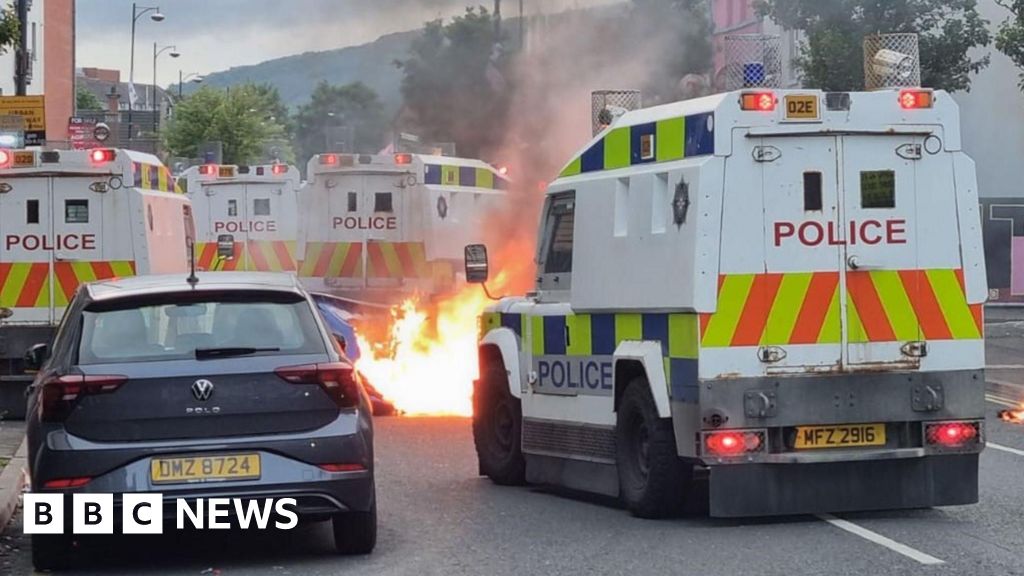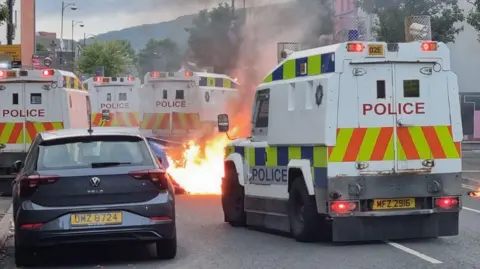 PA Media
PA MediaPolice Scotland is considering a request to send 120 officers to Northern Ireland following several nights of anti-immigration riots in Belfast and other parts of the UK.
Jon Boutcher, chief constable of the Police Service of Northern Ireland (PSNI), said his officers were exhausted and could not “stand alone to deal with disorder like this any more”.
Seventeen people were arrested and 11 of them have been charged following outbreaks of violence and disorder in Belfast.
Police Scotland said it had received “a number of requests for mutual aid” from UK forces which would be balanced against policing needs in Scotland.
Mr Boutcher said the PSNI needed support as it had been allowed to “decay” in recent years.
“Having those additional resources is vital to helping us be prepared for any future disorder,” he added.
Earlier, First Minister John Swinney said Scotland would remain vigilant following several nights of disturbances in England and Northern Ireland.
He said violence and Islamophobia had “no place” in Scotland – which has so far avoided any outbreaks of disorder.
Thousands of counter protesters took to the streets for peaceful rallies in towns and cities across England on Wednesday evening.
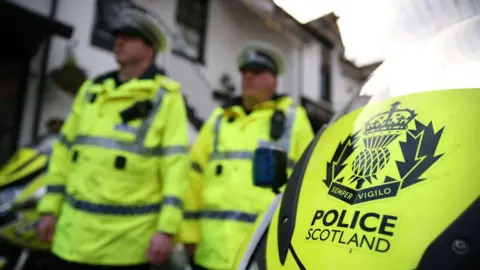 PA Media
PA MediaMet Police chief Mark Rowley called it a “very successful night”, saying the fears of extreme-right disorder were “abated”.
The National Police Coordination Centre, which provides support to forces across the UK, said it was considering a request from the Police Service in Northern Ireland (PSNI) for back-up from other forces.
“As a national service, Police Scotland has the ability to flex resources where the need is greatest in order to keep people safe,” said a Police Scotland spokesperson.
Anti-immigration violence in towns and cities in England and Northern Ireland over the weekend had led to more than 400 arrests.
This was sparked by misinformation over a fatal stabbing attack in Southport.
Mr Swinney said Police Scotland had “comprehensive” plans in place to deal with any riots.
He said the force had identified the possibility of anti-immigrant gatherings in Scotland, based on social media posts.
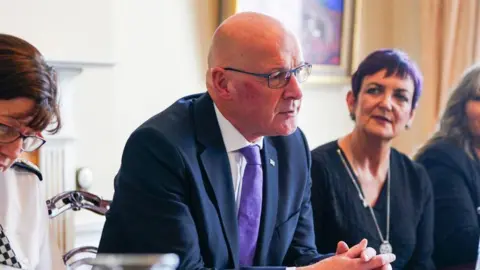 Getty Images
Getty ImagesMr Swinney said “thankfully” there had not been riots in Scotland, but added: “We have to remain vigilant because of the unacceptable conduct that’s taking place.”
He told BBC Radio’s Good Morning Scotland: “I want everyone to remain vigilant because we have communities that are experiencing a great deal of fear and anxiety as a consequence of what they’re observing in other parts of the United Kingdom.”
He said Police Scotland had “formidable” resources that could be deployed flexibly across the country if required.
Mr Swinney said the Crown Office and Procurator Fiscal Service could deliver “swift justice” under a strategy developed for the COP26 climate conference in Glasgow in 2021, that had been revisited after the UK riots.
Following a meeting with Chief Constable Jo Farrell in Edinburgh on Wednesday, he said there had been no requests for Police Scotland officers to be deployed south of the border to help deal with disorder.
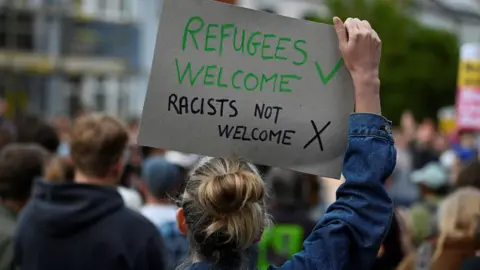 Getty Images
Getty ImagesEarlier this week, former first minister Humza Yousaf said he had questioned whether he and his family have a future in Scotland or the UK due to Islamophobia.
Mr Swinney said his predecessor’s comments were illustrative of a “deep sense of anxiety” in Muslim communities.
After meeting faith leaders on Wednesday, he said both the Muslim and Jewish communities were feeling “acutely anxious”.
And asked about the spread of disinformation about the riots, Mr Swinney said social media companies had “a lot of improvement to undertake in their conduct”.
He echoed calls from regulator Ofcom for social media firms to urgently protect users from content likely to incite violence or hatred.
The first minister said disinformation can be “profoundly dangerous”, citing false information spread about the stabbing of a woman in Stirling over the weekend.
He said Police Scotland “did absolutely the right thing to stamp on that misinformation and we will continue to do that where that is required”.
Scottish Labour leader Anas Sarwar told BBC Scotland News that the vast majority of people would look at recent events and be horrified by the acts of a “far right thuggery”.
Mr Sarwar called on social media companies to crack down on the spread of misinformation and “allowing the far right to organise, to recruit, to amplify and in some cases to fundraise.”
Asked whether this would infringe on the right to freedom of speech, he said: “I’m all for freedom of speech but there is a responsibility that comes on these platforms too and allowing known mistruths to be spread is not freedom of speech.”
Mr Sarwar said Scotland could not be complacent and must send the far right a “strong message to say they are not welcome here”.
‘Avoid speculation’
Following social media speculation about far-right activity in the city, Glasgow Central Mosque said Police Scotland had confirmed there was no intelligence to suggest it would be targeted.
In a statement, it said people should be vigilant but cautioned against alarm.
“We urge everyone to be wary of what you read on social media, avoid speculation and not to share unverified information,” the mosque added.
Reports of antisemitic incidents in the UK reached a record high in the first half of this year, according to figures from Jewish charity the Community Security Trust.
In Scotland there were 40 incidents from January to June, compared to 14 in the first six months of 2023. A total of 22 of these incidents were in Glasgow.
In their meeting with Mr Swinney on Wednesday, faith leaders agreed to work together to support vulnerable communities.


